TV Interview!
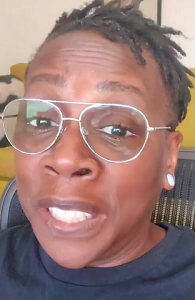
Interview with Gina Yashere of “Bob ❤️Abishola” on CBS by Suzanne 9/21/21
This was a fun TCA panel of various women who write TV comedies for Warner Brothers shows, “Leaning into Laughter: Exploring Timely Topics Through Humor & Heart.” I would have liked to have asked more questions, but it was only a half-hour long panel.
I chose Gina Yashere for my one question because I love her show, and she’s very funny in it as an actress as well as a writer. I was asking how much of her character, Yemi, is from her.
It was a fun panel with lots of humor. I would have loved to have asked the “Batwoman” showrunner, Caroline Dries, about the upcoming season and the crossover with the other CW shows. I was really surprised that no one else asked her that. I would also have liked to have asked Molly Smith Metzler about her upcoming show, “Maids.” On these TCA panels, I’m lucky if I get to ask more than one question the entire day.
Here is the list of panelists: Nkechi Okoro Carroll from The CW’s “All American” and the upcoming “All American: Homecoming,” Caroline Dries from The CW’s “Batwoman,” Maria Ferrari from CBS’s “United States of Al,” Molly Smith Metzler from Netflix’s upcoming “Maid,” Audrey Morrissey from NBC’s “The Voice,” and Gina Yashere from CBS’s “Bob ♥ Abishola.”
I first told Gina how much I loved her show and never miss it. She had quite a long answer to my question.
“It’s quite a lot of me in this show. A lot of the stories – similar immigrant stories, people coming from somewhere else coming to America trying to raise their kids in America (and it doesn’t even have to be America, it can be anywhere; I was born and raised in England – a lot of Abishola’s story is based on my parents’ story. My mum and dad are from Nigeria. They came to England. They had us in England and were up against racism, misogyny, all those kinds of things that are very apparent all over the world. And it’s just the story of their love and their triumph of raising their kids in another country, away from home. And the “Bob ♥ Abishola” story is just the coming together of the two families, the two cultures meeting, the fact that people from various backgrounds, no matter where they’re from, find that commonality. And it’s a story about love and inclusion, and just people coming together. Being born outside of my parents’ country and having to assimilate into society that was not necessarily mine originally, it’s just all of those things. So there’s a lot of me in that. Plus, I’m in the show as well ’cause I wrote myself in because I wanted all the checks.
(Laughter.) But, yeah. So there’s a lot of my family and a lot of the immigrant – it doesn’t even have to be Nigeria; it can be Vietnamese; it can be Chinese; it can be Indian; it could be Pakistani, Russian – it’s a very similar story.
Maria Ferrari was asked how her show will be handling current events in Afghanistan. Her answer was amazing: “We had shot one-and-a-half episodes during the week of the fall of Kabul and quickly realized that we had guessed wrong what was going to happen and that we were going to have to adjust our plans. And basically, on August 12th when Herat fell, which is the third-biggest city in Afghanistan which was a very anti-Taliban stronghold, that was when our writers started to feel that something very big was going to change and they had pressing needs to get their own family members out of Afghanistan. And it happens that kind of the Venn diagram of Vets and Afghans and Afghan Americans that is necessary to write this show is also the one that works as a fairly-effective rescue operation. So, we had to stick a pin in everything and focus first on our people that needed help and who needed to get their families out, which was just the wildest week of my life. I have never experienced anything like that. And at the same time, we were realizing that we needed to change everything we had done, and we needed to do it quickly. And so we chose to tell that story. We chose to tell the story of what we were experiencing and hoping that some of the fear and the urgency that we were feeling in the room would come through in this story, which also happened to map very tightly onto our characters because the writers and the characters are, by design, from similar walks of life. So that is the story that we chose to tell in our premiere.” Wow!
She was asked how CBS discussed with her about the show coming back (in relation to what she said) and whether they considered bringing the show back a bit later because of it. However, she replied that everyone at CBS was quite supportive of their show, and where they decided to go with it (particularly the script). She and the others didn’t feel it would be appropriate to show a re-run at this particularly sensitive time.
Dries was asked whether she thought that there was any difference between men and women’s writing. She didn’t think there is. She stated that “The job of the writer is to mimic the showrunner, the creator’s voice. So I don’t see gender in the words frankly, so I can’t really answer that with a definitive ‘here’s how it’s different.’ Each writer brings its own thing. If they’re mimicking the voice, they’re succeeding on the show.”
The reporter asked the other writers to respond as well. Metzler agreed with Dries and said, “I think not seeing gender in the words – that really rings true to me as well. ‘Maid’ is a women’s story. It’s based on a memoir written by a woman. I’m a woman. But when I went to staff the writers room, I hired two men and two women. And I think everyone got the tone of the show. I have to say in my personal experience, the writing was uniformly excellent. And if you covered the title page, I don’t think you could tell who’s a man and who’s a woman.”
Carroll also agreed that there’s no difference: “I am a female showrunner of a football show, and a baseball show coming up, so I very much agree with the ladies. It becomes about their talent on the page. It becomes about capturing the accurate, emotional voice of the show. And then it becomes about mimicking my voice. And we have a pretty great split in both rooms in terms of gender. And you’d be surprised what comes out of who. You would be surprised that some of our best football stuff is written by women. It just works out that way. So, I think I would have to agree. I think we’ve retained 90% of our staff since Season 1 on ‘All American’ because they’re all just really good at what they do and are really good at capturing not just my voice, but also instinctively the type of stories I want to use this show to tell. And so that’s what makes them successful.”
Morrissey replied that her show, “The Voice,” doesn’t have much writing. They just have one writer, and she’s female. With all of their people, they try to create a safe place for them to “be vulnerable and they can grow as artists – it’s gender-equal.”
Ferrari agreed that she didn’t see any differences. She likes to have all difference voices on her show – not just different genders but different ethnicities.
Gina gave another long answer: “Yeah, I think a lot of certain attitudes have kept women out of the writers’ room. It’s because they thought that we couldn’t write stories where maybe the cast were more male than female, whatever. And so, I like the fact that it doesn’t matter as long as you understand the subject you’re talking about, and you know the story you’re trying to tell, you can write for those people. We’re writing for people. And with my show, yeah, we have a nice even split, men and women. And in fact, I think we might have actually more women in the room. But we’ve got a nice split in our writers’ room. And also, in my show, more than half the cast is Nigerian, so we definitely wanted that Nigerian perspective. My parents were born in Nigeria. We’ve got another writer from Nigeria, a Nigerian American. And then, some of our actors are born and bred in Nigeria. So we wanted to get the perspective right. We wanted to make sure that it’s authentic as well, 100% authentic. We were also trying to smash stereotypes. And so you need people with those specific perspectives to be able to smash the stereotypes some people might have of Africa. If you watched the first episode of Season 3 of our show that aired last night, people are commenting and saying, “Oh, my gosh, we had no idea that Nigerian women live a certain way, that we had a certain image of that and how African people live” – little things like that. “They have really nice houses, we were surprised by that” – stuff like that. That’s why you need a good mix of people in the writers room, across gender, across sexuality, across race, to make sure that everything is covered, and covered properly.”
Dries was asked about Ryan Wilder’s story this season on “Batwoman.” She replied that now she has to fix the problems she’s made and taken responsibility for what she’s done. She added that we get to meet her mom and brother, and “we get to sort of carve out more details specifically about her personal life and all those new personal dynamics.”
Carroll was asked about crossovers between “All-American” and the new spinoff show. They do plan to have crossovers, but they have to wait and see how COVID and other factors affect their plans, but there will be familiar faces on the new show. She quickly added that they won’t be nearly as ambitious as the DC crossovers on The CW. She praised the showrunners and writers for those shows for being able to pull that off: “God bless the showrunners on the DC shows in how you pull that together because that is miraculous.”
Another press member asked her whether she would consider a third series someday, about soccer (since the first one is about football and the second one is about baseball). Gina brought the comedy, saying, “It’s not soccer, it’s football! It’s football! It’s not soccer! It’s football!” We all laughed at that. It was hilarious.
After correcting her, jokingly, that it’s football here in America, Carroll answered that she first needs to figure out how to fit sleep into her schedule before considering any other spinoffs.
Gina and Ferrari were asked a rather complex question about writing about the immigrants in their shows; specifically balancing writing about where they were before and where they are now.
Gina gave another lengthy answer: “For me, as a British-born Nigerian and watching American TV throughout my childhood, I didn’t like the way African people seemed to be depicted all the time. It felt like it was an image that had been just carried on way back from, I don’t know, Tarzan days, where Africans were seen a similar way. And I was like, “That’s not what we’re like.” And then, whenever I’d watch movies, Africa was seen as like a country rather than a continent with a lot of different countries, different languages, different traditions, different religions, different everything. When I went to make this show, I wanted to make sure that you could see the differences, see the nuances of where my people come from in Nigeria and how different it is and how hard we work. When the idea of the show first came around, we were still in the middle of the Trump era, and so there was all that anti-immigrant feeling. So we wanted to just say, “Look, we’re just people. We’re just doing the same as what you guys. We love the same. We want to send our kids to school. We want to work. We want to contribute. That’s what we’re doing.” And so that’s what I wanted to do with this show, and to show us as people. The language might be different. The food we eat might be different. Our clothes might be a little bit more colorful but, at the end of the day, we’re the same people. And also, Nigerians, Africans, we’re everywhere. The world is built on people moving to different places to find their fortune. It’s not like we’re the only ones that are doing it. White people have been doing it for hundreds of years – going to different places to find their fortunes. So it’s just saying, “Look, the journey’s the same for all of us. We’re all together in this.” And I wanted to get that balance right between showing my culture, showing the people, but also showing how we fit in America and how we can easily mix with other people. It’s not a problem. We’ve been here for a long time. Obviously, authenticity was extremely important to me because of who I’ve seen depicted in the past. So, we made a point of making sure the language is correct, the food is correct. When I met with Chuck to talk about the making of the show, I’d say things to him like, “If I say that this isn’t right, you’ve got to believe me.” If I say, “We don’t do this or we would never do this,” just little things. In American shows, kids coming in and putting their dirty shoes up on the couch and taking a bottle of milk from the fridge and drinking it straight from the bottle – that would never happen in an African family. So even the small minutia of things, we had to get it right. And I think it makes for a great show. People love it. Every immigrant family’s enjoying it because it’s their story too. And then wanting to introduce it to America and its people – let’s be honest, CBS is not the blackest channel, but we’re introducing it to an audience of people who may never have even fraternized with people from my culture. And they’ve grown to love the characters and the people. And so, as far as I’m concerned, that’s my job done.”
Ferrari said that the Afghani culture she works with has the same issue with the shoes. She even feels like it’s disrespectful now to walk on to their set with shoes on. She went on to say that bringing the first main character of a culture to TV puts pressure on your show “to be all things to all people, which is impossible.” They’re doing their best by showing us more of Al’s world both in his family “and also to introduce him to more Afghan-American communities in the Tristate area.” This season, Al will find romance; there will be a new Afghan-American DJ, played by one of their writers, Fahim Anwar; and we see more of his sister. They hope to move the focus of the show a little bit to these new characters and not just Al. She finished with, “You can’t really say anything meaningful about diversity unless you are showing it in the bodies of multiple characters, because that’s what diversity means.”
Carroll was also asked whether she’ll be introducing more immigrant characters in her show, since they’ll be at a college.
She replied, “Oh, absolutely. Especially at an HBCU. It’s the diaspora, which is what’s the beauty of it. That’s why I’m so excited to be putting an HBCU back on TV because it’s been a long time since we’ve seen that. But it really is sort of all the versions of Black. In the backdoor pilot we had – because I’m Nigerian, so I was like, “I must put my people in it” – and so we had some of the other characters that were in the classroom and interacted with Keisha and everything. We had both Nigerians and Nigerian Americans portrayed and we plan to continue with that. And also in the diversity of religion. And that’s a conversation I was having with my writers in the writers room just yesterday. I want to make sure as we’re telling these stories, it’s not the Christian Black experience or it’s not the non-denominational Black experience. I want to talk about the Muslim Black experience. If we’re saying we’re in this melting pot of the Black diaspora, I want to make sure we’re really representing that. And again, to what Maria said, we can’t represent everybody all at once and so it’s something that we’re just very conscious of in the room. And as we can organically sort of expand the storylines we’re telling around our series regulars, and incorporating these other cultures and religions and everything, we’re so excited to do that because that’s why we’re doing what we do.”
Morrissey was asked about the logistics of this season on “The Voice” since the audience is still not back to full capacity. She talked about all the issues they had, and how they discussed whether to bring any audience back or not. They did decide to bring some back. She went on at length about how the performers really need an audience to sing to. It helps them out. As a singer myself, I know that’s very true. I can imagine that whether you’re in front of 100 or 1000 people, it’s helpful to have an audience. She also mentioned that they have a new coach, Ariana Grande.
At the end, Morrissey also sent out some love to the other panelists. She said, “I’m such a fan of every other woman on this panel. And so I’m really excited to be on this panel with you. So, good luck to you all. Happy to meet you here.” Carroll gave her the love right back, saying that binging “The Voice” has been her go-to during the pandemic. Morrissey replied right back with “Please. I am binging “All-American” right now with my ten-year-old son. And literally, when I open my laptop to log on, there was Taye Diggs frozen from my Netflix…”
Gina chimed in with a naughty joke: “I think we’ve all had Taye Diggs on our laptops at some time” and everyone laughed.
MORE INFO:
Assembled here is a group of incredibly talented women who are responsible for some of the studio’s most innovative and inclusive television programming. From comedy to drama, reality or superheroes, this group has it covered. Each of these amazing women has played an instrumental role in creating more diverse storylines and bringing them to television screens everywhere. And critics have responded to the importance of these stories. From the GLAAD Award-nominated “Batwoman” and its historic casting of Javicia Leslie, the first Black actress to portray Batwoman in a live-action television or film production, to “Bob ♥ Abishola,” being the first series to depict a Nigerian family in a comedy, it’s apparent, these women are groundbreaking creators. “The Voice” has been recognized by the Television Academy with a phenomenal 69 Emmy nominations and 7 wins. And the hit drama “All American” received nominations from the NAACP Image Awards for Outstanding Writing in a Drama Series, as well as the Black Reel Awards for its ability to tackle a vast spectrum of social issues. And we are expanding the “All American” universe with the upcoming “All American: Homecoming.” Most importantly, the stories these women have elected to tell are authentic. From the timely “United States of Al,” which addresses the current crisis in Afghanistan, to “Maid,” which tackles the issue of poverty in America and has already appeared on “Vogue,” “Time,” and “Rolling Stone’s” Best-of-Fall TV lists. These women have all proven themselves to be creative forces to be reckoned with.
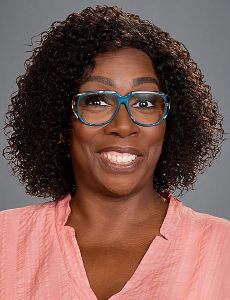 Gina Yashere
Gina Yashere
Co-Creator and Producer, Kemi in BOB ♥ ABISHOLA
Hometown: London
Birthday: April 6
Comedian Gina Yashere was born and raised in Bethnal Green, London to Nigerian parents. Prior to becoming a comedian, she worked as an elevator engineer for Otis.
In 1996 Yashere became a finalist in the Hackney Empire New Act of the Year, a British competition devoted to discovering and promoting new stand-up comedians and variety talent. In 2000 she began creating and performing popular comedic characters on the series “The Lenny Henry Show,” and in 2006 and 2007 she co-hosted the MOBO (Music of Black Origin) Awards in the U.K.
Yashere broke onto the American comedy scene as one of 10 finalists on “Last Comic Standing” in 2007. She went on to be named one of the top 10 rising talents in The Hollywood Reporter. In 2008 she became the first and only British comic to perform on “Def Comedy Jam.” In 2009 she performed a stand-up comedy routine on “The Tonight Show with Conan O’Brien” and appeared on the BBC’s “Live at the Apollo.” Starting in 2010, she appeared regularly on “The Tonight Show with Jay Leno” in a sketch comedy series called “Madame Yashere: The Surly Psychic,” in which she gave fake psychic readings to unsuspecting people on the street. Also, she appeared as Flo in several episodes of the ITV drama “Married Single Other.” In 2010 her one-hour comedy special, “Skinny B*tch,” premiered on SHOWTIME. In 2015 she was featured on “Gotham Comedy Live” and in 2016 appeared on SHOWTIME’s “The Nasty Show with Artie Lange.” She produced and starred in the comedy specials “Gina Yashere: Laughing to America” and “Gina Yashere: Ticking Boxes,” and performed on season two of the Netflix comedy showcase “The Standups.” In 2017 Yashere became the British correspondent for “The Daily Show with Trevor Noah.” As an in-demand voice artist, Yashere voiced the character of Keisha in the British cult hit “Bromwell High” and was the voice of Gravelle in the movie “Early Man” from the creators of “Wallace and Gromit” and “Chicken Run.”
In addition to performing for audiences in Europe, the U.S. and Australia, Yashere is a highly sought-after comedian in Asia, selling out shows in Singapore, Cambodia, Vietnam, Malaysia and Hong Kong. The U.K.’s Black Entertainment and Comedy Awards named her “Best Comedian” four years in a row, and she has performed several times at the prestigious Just for Laughs Comedy Festival in Montreal and Toronto.
Currently, Yashere is writing an autobiography scheduled for release next year.
Born in London, Yashere currently resides in Los Angeles. Her birthday is April 6. Her web site is www.ginayashere.com, and she can be followed on Instagram and Twitter @ginayashere and on Facebook @ginaisfunny.
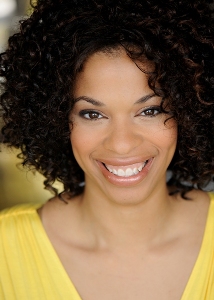 NKECHI OKORO CARROLL
NKECHI OKORO CARROLL
Showrunner/Executive Producer of “All American”
Nkechi Okoro Carroll is the Executive Producer/Showrunner of the Greg Berlanti-produced drama series “All American.”
Prior to “All American,” Okoro Carroll served as Co-Executive Producer on the drama series “The Resident” and “Rosewood.” Her other television producing credits include, “Bones” and “The Finder.” Additionally, Okoro Carroll is in an exclusive, multiyear overall deal with Warner Bros Studios.
Born in New York, raised in Nigeria, Cote d’Ivoire and England, Okoro Carroll earned a B.A. in Economics and French from the University of Pennsylvania and Masters in International Economics from New York University. Prior to her television writing career, Okoro Carroll worked for the Federal Reserve where her responsibilities included managing the reserve position for the U.S. Banking system and analyzing the impact of monetary policy decisions on the domestic money markets. All of which she did while still writing and producing plays in New York.
Okoro Carroll currently resides in Los Angeles.
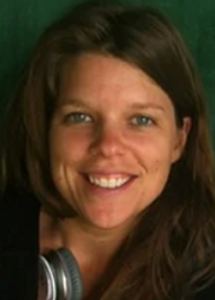 CAROLINE DRIES
CAROLINE DRIES
Executive Producer/Showrunner of “Batwoman”
Caroline Dries is the Executive Producer/Showrunner of the Greg Berlanti-produced drama series “Batwoman.” Dries also developed the series for The CW.
Prior to “Batwoman,” Dries served as a producer on “Melrose Place” (2009-2010) and was an executive producer on The CW’s hit series, “The Vampire Diaries.” Her other television credits include “Smallville” and “Arrow.” Dries began her career in television as a PA, writers assistant and script coordinator on “Smallville” before joining the series as a staff writer.
Dries was born and raised in Milwaukee, Wisconsin. She attended NYU as an undergraduate, earning a BFA in Psychology. Afterwards, Dries attended the University of Southern California’s prestigious School of Cinematic Arts where she earned her master’s degree.
Dries currently resides in Los Angeles with her wife, Danielle, and their new baby girl.
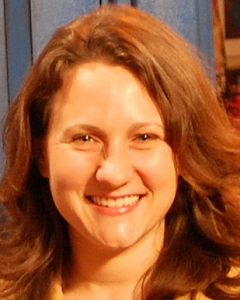 Maria Ferrari
Maria Ferrari
Executive Producer/Creator, UNITED STATES OF AL
March 2021
Maria Ferrari began her career as a script coordinator for the television series “Blue Collar TV” and “How I Met Your Mother,” on the Network. She went on to write multiple scripts for both shows before joining “The Bill Engvall Show” as a staff writer. Next, Ferrari joined “The Big Bang Theory,” on the Network, where she rose to executive producer and was nominated for three Emmy Awards for Outstanding Comedy Series.
Ferrari’s additional television credits include “Young Sheldon,” also on the Network.
Ferrari is a graduate of Northwestern University and resides in Los Angeles.
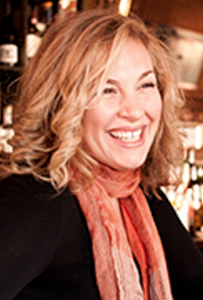 Molly Smith Metzler (playwright) is the author of Cry it Out, Elemeno Pea, The May Queen, Carve, Close Up Space and Training Wisteria. Her regional credits include: Northlight Theatre, Actors Theatre of Louisville, South Coast Repertory, Boston Playwrights’ Theatre, The Eugene O’Neill Theater Center, Chautauqua Theater Company, City Theatre, PlayMakers Repertory Company, Geva Theatre Center, Mixed Blood Theatre Company and more. In New York City: Manhattan Theatre Club (MTC). Metzler’s awards include the Lecomte du Nouy Prize from Lincoln Center, the Harold and Mimi Steinberg National Student Playwriting Award from The Kennedy Center, the Association for Theatre in Higher Education’s David Mark Cohen National Playwriting Award, the Mark Twain Prize for Comic Playwriting and a finalist nod for the Susan Smith Blackburn Prize. She is a proud alumna of the Ars Nova Play Group, the Dorothy Strelsin New American Writers Group at Primary Stages and the Cherry Lane Mentor Project. In television, Metzler has written for Casual (Hulu), Orange Is the New Black (Netflix), Codes of Conduct (HBO), and is currently a writer/producer on Shameless (Showtime). She is also a screenwriter, currently adapting Ali Benjamin’s award-winning novel The Thing About Jellyfish into a film for OddLot Entertainment with Made Up Stories and Pacific Standard (Reese Witherspoon’s company). Metzler was educated at the State University of New York at Geneseo, Boston University, New York University’s Tisch School for the Arts and the Juilliard School. She lives in Los Angeles and Kingston, N.Y.
Molly Smith Metzler (playwright) is the author of Cry it Out, Elemeno Pea, The May Queen, Carve, Close Up Space and Training Wisteria. Her regional credits include: Northlight Theatre, Actors Theatre of Louisville, South Coast Repertory, Boston Playwrights’ Theatre, The Eugene O’Neill Theater Center, Chautauqua Theater Company, City Theatre, PlayMakers Repertory Company, Geva Theatre Center, Mixed Blood Theatre Company and more. In New York City: Manhattan Theatre Club (MTC). Metzler’s awards include the Lecomte du Nouy Prize from Lincoln Center, the Harold and Mimi Steinberg National Student Playwriting Award from The Kennedy Center, the Association for Theatre in Higher Education’s David Mark Cohen National Playwriting Award, the Mark Twain Prize for Comic Playwriting and a finalist nod for the Susan Smith Blackburn Prize. She is a proud alumna of the Ars Nova Play Group, the Dorothy Strelsin New American Writers Group at Primary Stages and the Cherry Lane Mentor Project. In television, Metzler has written for Casual (Hulu), Orange Is the New Black (Netflix), Codes of Conduct (HBO), and is currently a writer/producer on Shameless (Showtime). She is also a screenwriter, currently adapting Ali Benjamin’s award-winning novel The Thing About Jellyfish into a film for OddLot Entertainment with Made Up Stories and Pacific Standard (Reese Witherspoon’s company). Metzler was educated at the State University of New York at Geneseo, Boston University, New York University’s Tisch School for the Arts and the Juilliard School. She lives in Los Angeles and Kingston, N.Y.
 Audrey Morrissey is an executive producer and the creative force behind “The Voice,” NBC’s four-time Emmy Award-winning musical competition series, and “Songland,” NBC’s brand new songwriting competition series.
Audrey Morrissey is an executive producer and the creative force behind “The Voice,” NBC’s four-time Emmy Award-winning musical competition series, and “Songland,” NBC’s brand new songwriting competition series.
Morrissey’s roots are in music television. A veteran of MTV, she spent nine years at the network in their music and specials division
working on their high-profile music series and annual event specials, such as “Unplugged,” “VMAs,” and “Movie Awards.”
After several years in New York, she was sent to Los Angeles to build the West Coast production department for both MTV and VH1.
After MTV, Morrissey joined Jimmy Iovine and Doug Morris as the Head of Television for their online music venture, Farmclub.com. While at Farmclub, she executive produced 65 episodes of the weekly music series “Farmclub.com” on USA Network and met her future partner, Ivan Dudynsky, with whom she started Live Animals Productions and serves as executive producer.
Since the formation of Live Animals, Morrissey has executive produced award shows, music specials, reality series, music videos and promos. She has executive produced the Emmy Awards, “People’s Choice Awards,” “MTV Movie Awards,” “CMT Music Awards” and “Teen Choice Awards.” She also executive produced the NBC series “I Can Do That.” Morrissey has not only gained the attention of millions of viewers, but critics as well. In addition to five PGA Awards for Outstanding Producer of Competition Television, “The Voice” has earned four Emmy Awards for Outstanding Reality Competition Program in 2013, 2015, 2016, and 2017.
Proofread and Edited by Brenda
Back to the Primetime Articles and Interviews Page

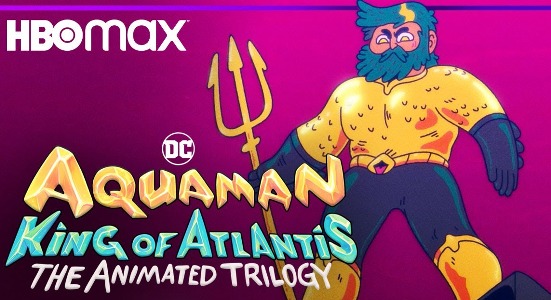 AQUAMAN: KING OF ATLANTIS
AQUAMAN: KING OF ATLANTIS
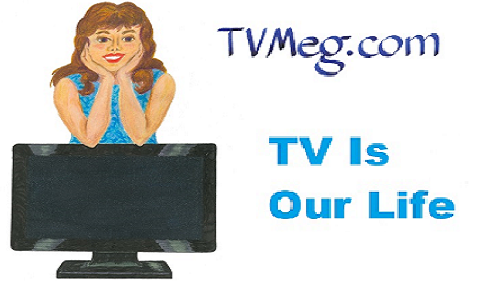



 Gina Yashere
Gina Yashere NKECHI OKORO CARROLL
NKECHI OKORO CARROLL CAROLINE DRIES
CAROLINE DRIES Maria Ferrari
Maria Ferrari Molly Smith Metzler (playwright) is the author of Cry it Out, Elemeno Pea, The May Queen, Carve, Close Up Space and Training Wisteria. Her regional credits include: Northlight Theatre, Actors Theatre of Louisville, South Coast Repertory, Boston Playwrights’ Theatre, The Eugene O’Neill Theater Center, Chautauqua Theater Company, City Theatre, PlayMakers Repertory Company, Geva Theatre Center, Mixed Blood Theatre Company and more. In New York City: Manhattan Theatre Club (MTC). Metzler’s awards include the Lecomte du Nouy Prize from Lincoln Center, the Harold and Mimi Steinberg National Student Playwriting Award from The Kennedy Center, the Association for Theatre in Higher Education’s David Mark Cohen National Playwriting Award, the Mark Twain Prize for Comic Playwriting and a finalist nod for the Susan Smith Blackburn Prize. She is a proud alumna of the Ars Nova Play Group, the Dorothy Strelsin New American Writers Group at Primary Stages and the Cherry Lane Mentor Project. In television, Metzler has written for Casual (Hulu), Orange Is the New Black (Netflix), Codes of Conduct (HBO), and is currently a writer/producer on Shameless (Showtime). She is also a screenwriter, currently adapting Ali Benjamin’s award-winning novel The Thing About Jellyfish into a film for OddLot Entertainment with Made Up Stories and Pacific Standard (Reese Witherspoon’s company). Metzler was educated at the State University of New York at Geneseo, Boston University, New York University’s Tisch School for the Arts and the Juilliard School. She lives in Los Angeles and Kingston, N.Y.
Molly Smith Metzler (playwright) is the author of Cry it Out, Elemeno Pea, The May Queen, Carve, Close Up Space and Training Wisteria. Her regional credits include: Northlight Theatre, Actors Theatre of Louisville, South Coast Repertory, Boston Playwrights’ Theatre, The Eugene O’Neill Theater Center, Chautauqua Theater Company, City Theatre, PlayMakers Repertory Company, Geva Theatre Center, Mixed Blood Theatre Company and more. In New York City: Manhattan Theatre Club (MTC). Metzler’s awards include the Lecomte du Nouy Prize from Lincoln Center, the Harold and Mimi Steinberg National Student Playwriting Award from The Kennedy Center, the Association for Theatre in Higher Education’s David Mark Cohen National Playwriting Award, the Mark Twain Prize for Comic Playwriting and a finalist nod for the Susan Smith Blackburn Prize. She is a proud alumna of the Ars Nova Play Group, the Dorothy Strelsin New American Writers Group at Primary Stages and the Cherry Lane Mentor Project. In television, Metzler has written for Casual (Hulu), Orange Is the New Black (Netflix), Codes of Conduct (HBO), and is currently a writer/producer on Shameless (Showtime). She is also a screenwriter, currently adapting Ali Benjamin’s award-winning novel The Thing About Jellyfish into a film for OddLot Entertainment with Made Up Stories and Pacific Standard (Reese Witherspoon’s company). Metzler was educated at the State University of New York at Geneseo, Boston University, New York University’s Tisch School for the Arts and the Juilliard School. She lives in Los Angeles and Kingston, N.Y. Audrey Morrissey is an executive producer and the creative force behind “The Voice,” NBC’s four-time Emmy Award-winning musical competition series, and “Songland,” NBC’s brand new songwriting competition series.
Audrey Morrissey is an executive producer and the creative force behind “The Voice,” NBC’s four-time Emmy Award-winning musical competition series, and “Songland,” NBC’s brand new songwriting competition series.